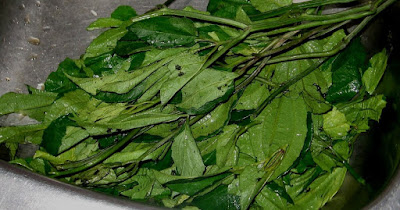Looking for the fastest Blood Tonic? Try Ugu leaves (Pumpkin leaves)
The vegetable, Ugu or Ugwu (which is also called Fluted pumpkin or pumpkin leaves, and known scientifically as Telfairia Occidentalis) is a tropical vine plant found in West Africa, but appears mostly in its cultivated form in various parts of southern Nigeria. The vegetable are generally cultivated for its palatable and nutritious leaves, which are used mainly as vegetable and consumed in various forms. The seeds which are also nutritious and rich in oil are also used for cooking and to produce soap. This post will describe the benefits of Ugu or Ugwu leaves. Read on...
Ugu is one of the nice vegetables which are very low in calories, providing just 26 Cal per 100g and it is free of saturated fats and cholesterol. It has long been discovered that when its essential ingredients are not destroyed, it has the capacity to increase the red blood cells within a short period of time after consumption. The rate at which it increases the red corpuscles can be enhanced further by mixing it with beverages such as malt drinks and milk. If you lack blood or feel weak or dizzy, you may want to use this natural method to gain blood quickly.
A study carried out by a team of Nigerian researchers led by a Professor of the University of Lagos, Olukemi Odukoya, at the Lagos University Teaching Hospital (LUTH), Idi-Araba, revealed that “High consumption of vegetables has been associated with a lowered incidence of degenerative diseases like high blood pressure, diabetes, cancers, arthritis, obesity, stroke, gallstones, hemorrhoids/piles etc. These protective effects are believed to be because of the various antioxidants contained in them.
It was also stated that the antioxidant activities of hot water extracts of 21 green leafy vegetables were assessed, among which were fluted pumpkin (Ugu) and was found highly useful in that regard. The research showed that a meal of fluted pumpkin leaves could be a useful therapy for very high levels of cholesterol in the blood (hypercholesterolemia), high blood sugar levels (diabetes) and heart diseases.
Previous studies have also indicated that fluted pumpkin possesses anti-inflammatory (painkiller), antibacterial, erythropoietic (Erythropoiesis is the process by which red blood cells – erythrocytes – are produced), anti-cholesterolemic (preventing the buildup of cholesterol) and anti-diabetic (treating diabetes mellitus by lowering glucose levels in the blood) activities.
This vegetable which can grow anywhere is a very rich source of dietary fibre, minerals, vitamins A, B6, C, protein, riboflavin, niacin, thiamin, foliate, iron, magnesium, phosphorus, potassium, and manganese, anti-oxidants and vitamins flavonoid poly-phenolic antioxidants like lutein, xanthins and carotenes.
A researcher and food scientist named Peter Nwosu also talked about this vegetable to PharmaNews. Nwosu mentioned that the leaves contain essential oils, while the roots contain cucurbitacins, sesquiterpene and lactones. The fresh leaves sliced and mixed with coconut water and salt is stored in a bottle and used for the treatment of convulsion in ethno medicine. The leaf extract is useful in the management of cholesterolemia, liver problems and impaired defence immune systems. The high protein content in leaves of plants such as fluted pumpkin could have supplementary effect for the daily protein requirement of the body.
Symptoms of protein energy malnutrition, such as Kwashiorkor and Marasmus, were rarely observed among dwellers in regions where an adequate amount of protein is obtained from fruits or seeds and leaves of plants rich in proteins such as fluted pumpkin. He also noted that some of its medicinal abilities have not yet been scientifically proven, but in the orthodox medicine, especially in Nigeria, it is commonly used and recommended mostly in patients who have lost blood as a result of malaria or typhoid fever.
“Pregnant women and lactating mothers should take in as much as they can of this vegetable and, of course, other green leafy plants (green foods are healthy). Mothers should also incorporate it into their children’s meals because the leaves are rich in iron and play a key role in preventing anaemia illnesses; and like I said, not only Ugu (fluted pumpkin) but all vegetables.”
Ugwu leaves can be eaten cooked or raw. Although, the raw form is not usually chewed directly, it is usually squeezed and used as a short-term blood tonic. When squeezed, it can be mixed with malt, milk or other beverages and is believed to be one of the fastest home remedies to gain blood. For the best results, choose young fresh leaves. If you wait until your pumpkins are huge, the leaves may be tougher, although they are still fine if cooked long enough to become very soft.
Fluted pumpkins can be stored in the refrigerator; not for too long though, so that the essential nutrients are preserved. It can also be dried to be used in seasons when it is scarce, but the drying must be carried out directly under the sun, as some nutrients may be destroyed in the process. All vegetables must be properly washed before consumption in order to avoid contracting other diseases from dirt.

Comments